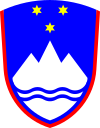 |
|---|
UN Member State Contents |
The Constitution of the Republic of Slovenia (Slovene : Ustava Republike Slovenije) is the fundamental law of the Republic of Slovenia.
 |
|---|
UN Member State Contents |
The Constitution of the Republic of Slovenia (Slovene : Ustava Republike Slovenije) is the fundamental law of the Republic of Slovenia.
Preparation of the document began in August 1987 in the Slovene Writers' Association which published an informal draft, and after the DEMOS coalition won the majority in the Assembly of the Socialist Republic of Slovenia in April 1990, continued in the Assembly. [1] The large part of the work was completed at Podvin Castle near Radovljica in August 1990 under the leadership of the lawyer Peter Jambrek. [2] The Constitution was adopted by the National Assembly of the Republic of Slovenia on 23 December 1991. [3]
Since its proclamation, the Constitution has been amended seven times, with four major amendments: [2]
The document is divided into ten chapters: